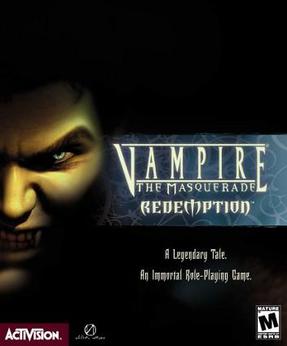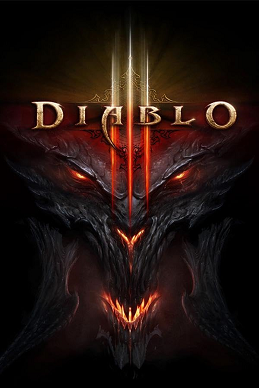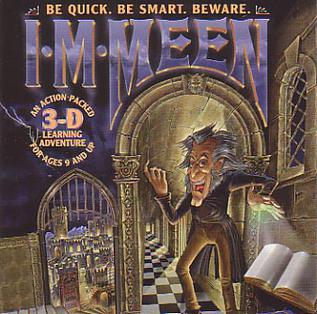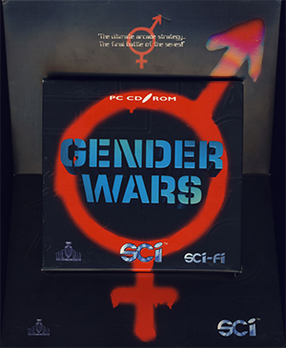
Mario Is Missing! is a 1993 educational game developed and published by The Software Toolworks for MS-DOS, Nintendo Entertainment System, and Super Nintendo Entertainment System, later released on Macintosh in 1994. The player controls Luigi, who must travel around the world to find and return stolen treasures as part of a quest to find his brother, Mario, who has been captured by Bowser. Mario Is Missing!, part of a series of educational Mario games, was Luigi's second starring role in a video game, following the 1990 Game Watch game Luigi's Hammer Toss and preceding the 2001 GameCube game Luigi's Mansion.

Vampire: The Masquerade – Bloodlines is a 2004 action role-playing video game developed by Troika Games and published by Activision for Microsoft Windows. Set in White Wolf Publishing's World of Darkness, the game is based on White Wolf's role-playing game Vampire: The Masquerade and follows a human who is killed and revived as a fledgling vampire. The game depicts the fledgling's journey through early 21st-century Los Angeles to uncover the truth behind a recently discovered relic that heralds the end of all vampires.

Krome Studios Melbourne, originally Beam Software, was an Australian video game development studio founded in 1980 by Alfred Milgrom and Naomi Besen and based in Melbourne, Australia. Initially formed to produce books and software to be published by Melbourne House, a company they had established in London in 1977, the studio operated independently from 1987 until 1999, when it was acquired by Infogrames, who changed the name to Infogrames Melbourne House Pty Ltd.. In 2006 the studio was sold to Krome Studios.

Vampire: The Masquerade – Redemption is a 2000 role-playing video game developed by Nihilistic Software and published by Activision. The game is based on White Wolf Publishing's tabletop role-playing game Vampire: The Masquerade, a part of the larger World of Darkness series. It follows Christof Romuald, a 12th-century French crusader who is killed and revived as a vampire. The game depicts Christof's centuries-long journey from the Golden Ages of 12th century Prague and Vienna to late-20th century London and New York City in search of his humanity and his kidnapped love, the nun Anezka.

Jurassic Park: Operation Genesis is a construction and management simulation video game based on the Jurassic Park series developed by Blue Tongue Entertainment and published by Universal Interactive, with the console versions being co-published with Konami in Japan. It was released for Windows, Xbox, and PlayStation 2. The game's primary goal is to construct a five-star rated dinosaur theme park named Jurassic Park on custom-generated islands by hatching dinosaurs, building attractions, keeping visitors entertained, and ensuring the park's safety.

Moonmist is an interactive fiction game written by Stu Galley and Jim Lawrence and published by Infocom in 1986. The game was released simultaneously for the Amiga, Amstrad CPC, Apple II, Atari 8-bit computers, Atari ST, Commodore 64, MS-DOS, TRS-80, TI-99/4A, and Mac. It is Infocom's twenty-second game. Moonmist was re-released in Infocom's 1995 compilation The Mystery Collection, as well as the 1996 compilation Classic Text Adventure Masterpieces.

Star Wars: Yoda Stories is a 1997 adventure video game based on the Star Wars franchise developed by LucasArts. The game is the second and last title in LucasArts' Desktop Adventures series, preceded by Indiana Jones and His Desktop Adventures. The game was released in March 1997 for Microsoft Windows and ported to Game Boy Color by Torus Games in December 1999.

MechWarrior 2: 31st Century Combat is a vehicle simulation game developed and published by Activision, released in 1995 as part of the MechWarrior series of video games in the BattleTech franchise. The game is set in 3057, and is played as a tactical simulation that incorporates aspects of real-time first-person combat and the physical simulation of the player's mech. It is a game recreation of the "Refusal War." The player can join one of the clans, Clan Jade Falcon or Clan Wolf while engaging in up to 32 missions.

Extreme PaintBrawl is a paintball video game released for DOS/Windows on October 20, 1998. The game is considered to be one of the worst video games ever made. Extreme PaintBrawl was developed in two weeks using the Build engine; its soundtrack was composed by musician Todd Duane, who sent his demo tracks to Head Games. The game was followed by Extreme PaintBrawl 2 in 1999, Ultimate PaintBrawl 3 in 2000, and Extreme PaintBrawl 4 in 2002, all of which were met with negative reviews.

Home Improvement: Power Tool Pursuit! is a 2D platform game for the Super Nintendo Entertainment System based on the sitcom of the same name. A Sega Genesis version was planned but never released.

Diablo III is a 2012 online-only action role-playing dungeon crawling game developed and published by Blizzard Entertainment as the third installment in the Diablo franchise. It was released for Microsoft Windows and OS X in May 2012, PlayStation 3 and Xbox 360 in September 2013, PlayStation 4 and Xbox One in August 2014, and Nintendo Switch in November 2018. Set 20 years after the events of Diablo II, players control one of seven character classes – Barbarian, Crusader, Demon Hunter, Monk, Necromancer, Witch Doctor, or Wizard – and are tasked with defeating Diablo.

I.M. Meen is a 1995 fantasy educational game for DOS to teach grammar to children. It is named for its villain, Ignatius Mortimer Meen, a "diabolical librarian" who lures young readers into an enchanted labyrinth and imprisons them with monsters and magic.

Star Trek: Voyager – Elite Force is a first-person shooter video game developed by Raven Software and published by Activision. The game was originally released on September 15, 2000 for Windows and Mac OS. A port for Mac OS developed by Westlake Interactive and published by Aspyr Media was released on November 20, 2002. Elite Force was ported to the PlayStation 2 by Pipe Dream Interactive and published by Majesco Entertainment on December 11, 2001.

Sleeping Dogs is a 2012 action-adventure game developed by United Front Games and published by Square Enix. The game was released for PlayStation 3, Windows, and Xbox 360 in August 2012. Set in contemporary Hong Kong, the story follows martial artist and undercover police officer Wei Shen who infiltrates the Sun On Yee Triad organization. Gameplay focuses on Wei Shen's martial arts moves, fighting, shooting and parkour abilities, and on gadgets that can be used for combat and exploration. Players must complete missions to unlock content and continue the story, but they may instead freely roam the game's open world environment and engage in both legal and criminal activities. The latter may incite a police response, the intensity of which is controlled by a "heat" system. Actions such as fighting, driving and racing grant Shen statistical rewards and earn the player achievements.

Destiny is an online first-person shooter video game developed by Bungie. It was released worldwide on September 9, 2014, for the PlayStation 3, PlayStation 4, Xbox 360, and Xbox One consoles. Destiny marked Bungie's first new console franchise since the Halo series, and it was the first game in a ten-year agreement between Bungie and Activision. Set in a "mythological science fiction" world, the game features a multiplayer "shared-world" environment with elements of role-playing games. Activities in Destiny are divided among player versus environment (PvE) and player versus player (PvP) game types. In addition to normal story missions, PvE features three-player "strikes" and six-player raids. A free roam patrol mode is also available for each destination which feature public events. PvP features objective-based modes, as well as traditional deathmatch game modes.

Transformers: Devastation is a 2015 action-adventure game based on the Transformers franchise developed by PlatinumGames and published by Activision. In the game, players control five Autobots as they battle to stop a Decepticon plot to turn the Earth to metal. Several creatives who worked on past Transformers media, including writers, actors, and musicians, contributed to the game's development.

Gender Wars is a real-time tactics action game developed by The 8th Day and Sales Curve and published for DOS by GT Interactive and Sales Curve Interactive in 1996. A port for the PlayStation was in development but was cancelled.

Call of Duty: Black Ops 4 is a 2018 first-person shooter game developed by Treyarch and published by Activision. It is the fifteenth installment of the Call of Duty series and the fifth entry in the Black Ops sub-series, following Call of Duty: Black Ops III (2015). The game was released on October 12, 2018, for PlayStation 4, Windows, and Xbox One.

Call of Duty: Warzone was a 2020 free-to-play battle royale first-person shooter game developed by Raven Software and Infinity Ward and published by Activision. It was released on March 10, 2020, for PlayStation 4, Windows, and Xbox One as part of Call of Duty: Modern Warfare (2019) and was subsequently connected to Call of Duty: Black Ops Cold War (2020) and Call of Duty: Vanguard (2021), but did not require purchase of any of the aforementioned titles. Warzone allowed online multiplayer combat among 150 players and featured both cross-platform play and cross-platform progression between the three aforementioned titles.



















